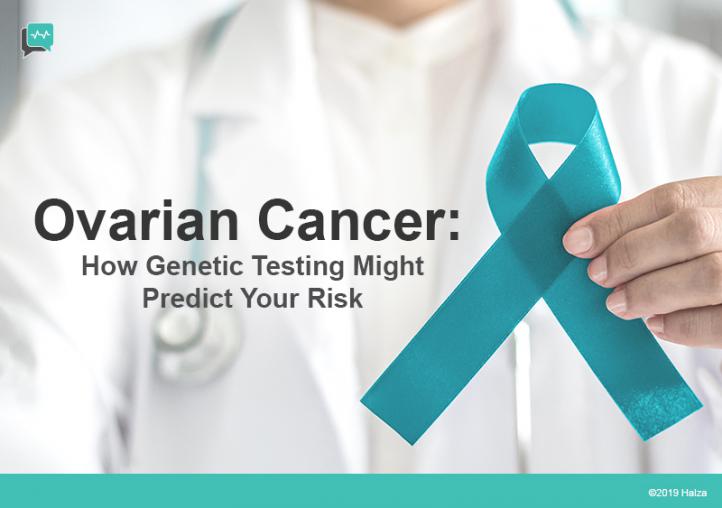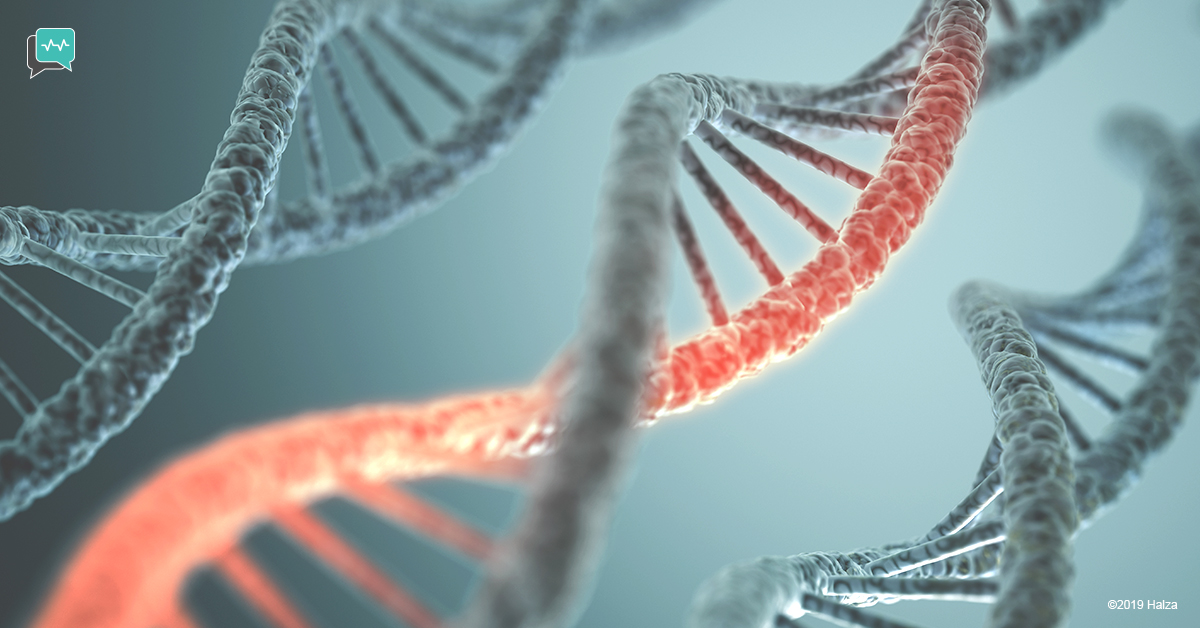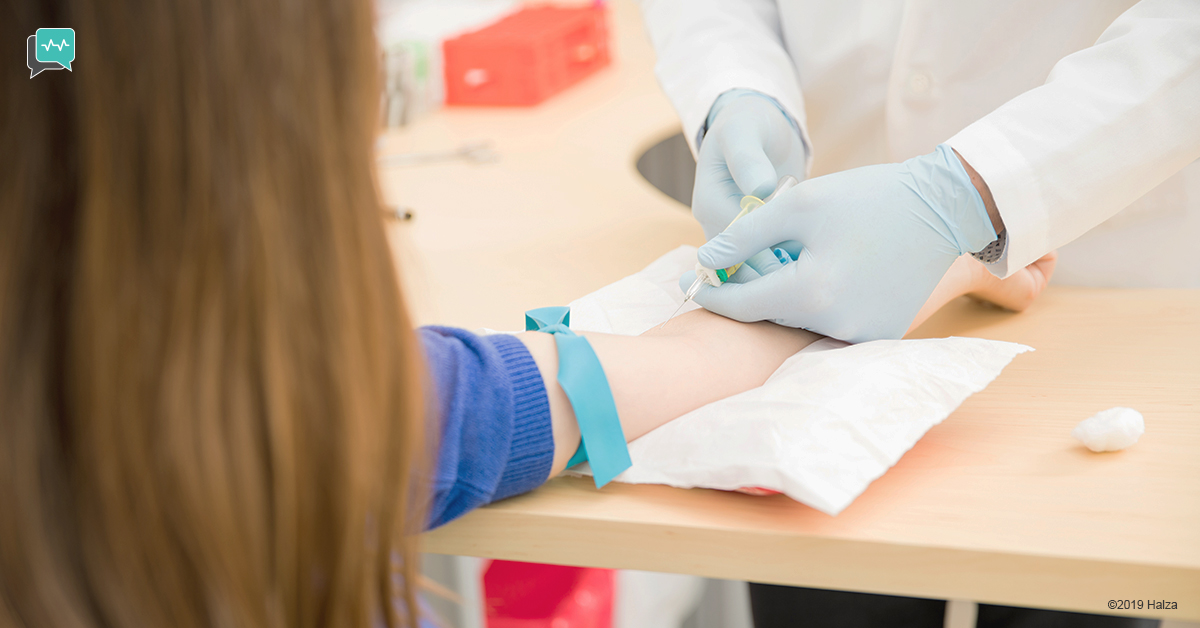Genetic Testing & How it Can Predict Risk of Ovarian Cancer

Has one or more of your relatives had ovarian or breast cancer?
If so, did you know that a simple blood test may be able to determine if you are at increased risk of developing ovarian, breast, or other types of cancer?
How does ovarian cancer develop?
Ovarian cancer develops as a result of an abnormal change to a gene. An abnormal change to a gene is called a ‘mutation’.
What is a gene, and how does it mutate?
A gene is a tiny segment of DNA that determines all the physical traits we are born with. Genes are in every one of our cells, and they provide a blueprint for how each cell functions.
Some gene mutations happen during a person’s lifetime, often for reasons that we don’t yet understand. Mutations that are acquired after birth don’t affect every cell.

Other gene mutations are inherited. When a mutation is inherited, every cell has the mutation. This is because the mutation is passed down. Half of a person’s genes come from their mother and half come from their father. Therefore, if one parent has a particular gene mutation, each child has a 50% chance of being born with that mutation.
Are gene mutations dangerous?
Mutations don’t always cause problems, but some mutations are very harmful. Mutations to genes called BRCA1 and BRCA2 are known to cause a significantly increased risk of breast and/or ovarian cancer.
- Women with a mutation on the BRCA1 gene have approximately a 60% chance of developing breast cancer by age 70 and a 44% chance of developing ovarian cancer.
- Women with a mutation on the BRCA2 gene have approximately a 45% chance of developing breast cancer by age 70 and a 17% chance of developing ovarian cancer.
- Women without these mutations have a 7% chance of developing breast cancer and a 1.3% chance of developing ovarian cancer.
BRCA-associated cancers of the breast and/or ovaries are commonly seen in people in their 30s and 40s, and even in their 20s. BRCA mutations are also associated with increased risks of several other types of cancer, including prostate cancer in men and pancreatic cancer.
Related reading:
- What else causes prostate cancer and are you at risk?
- What can you do for your partner if they have been diagnosed with prostate cancer?

Are all BRCA1 mutations the same? Are all BRCA2 mutations the same?
There are many different variations (variants) of BRCA1 AND BRCA2 mutations.
Laboratory tests are available to look for some of the variants of inherited BRCA mutations. By testing large numbers of people with BRCA mutations, scientists have been able to identify variants that are most likely to affect different populations. For example, a person of Dutch descent would probably have a different BRCA mutation than someone of Hispanic descent. The Dutch person would probably have the same variation as someone else of Dutch descent.
Unfortunately, with some exceptions, we do not yet know exactly which population is affected by which variant. Although ovarian cancer is the 8th most common cancer in women, genetic testing for BRCA mutations is not yet easily accessible in many countries. As genetic testing becomes less expensive and more widely available, scientists will be better able to determine which variant is most common within a specific population.

If my test for a BRCA mutation is negative, does that mean I won’t get ovarian cancer?
The BRCA genes are the genes most closely studied and associated with ovarian cancer risk. However, inherited mutations that lead to an increased risk of ovarian cancer (or to other cancers or health problems) can occur on other genes. Ovarian cancer can also develop from gene mutations that are acquired during a woman’s lifetime.
How do I know if I should be tested for an inherited BRCA mutation?
In the general population, most people do not need to be tested. However, certain factors in your personal or family history might suggest the possibility of a BRCA mutation. These factors include:
- Having breast cancer before age 50
- Having cancer in both breasts
- Diagnoses of breast and ovarian cancers in different relatives sharing your lineage
- A diagnosis of breast and ovarian cancer in a single relative sharing your lineage
- Several cases of breast cancer among relatives sharing your lineage
- Certain ethnic backgrounds, such as Ashkenazi Jewish, among others. Variants have been found to varying degrees in many ethnicities.
- Breast cancer in a male relative (any age) sharing your lineage
If you have a relative with cancer caused by an inherited mutation, it is possible that you and/or your relatives might have the same mutation. Even if your relative with cancer is not found to have a harmful mutation, but your family has one or more of the risk factors listed above, you might want to speak with a genetic counselor. Genetic counselors can assess your risk factors for ovarian and other cancers and help you decide if you should get tested for mutations.
Related reading:
- Here’s how to manage the everyday challenges of battling breast cancer.
- How can you help your young kids understand your breast cancer diagnosis?
I’m not sure I want to be tested. How do I decide?
Things to consider before deciding to be tested include:
- What will I do if the test shows that I have the mutation?
- Will a positive result affect my decision to have children? Am I willing to risk passing the mutation on to my children?
- Do I want to be tested only for the specific mutation that my relative had, or do I want my genes to be tested for other mutations as well?
- Am I using a laboratory with excellent technical expertise? What are the chances that the lab might make a mistake?
- How will I feel if the test finds a different mutation that I wasn’t expecting? What if no one knows what that mutation means?
- If I have an inherited mutation, will it affect my ability to get health insurance or a job?
- What would I tell someone I am dating? Would I tell them after a first or second date…or when we are engaged?
- Do I understand that the test does not look for every possible harmful mutation?
What can I do if the test is positive and I have an increased risk of cancer?
If the mutation is on a BRCA gene and you have a high risk of ovarian and other cancers, you have several options.
These include:
- Having additional screening tests for breast cancer for both men and women.
- Having surgery to remove the breasts and/or ovaries before cancer develops. Surgery to remove the ovaries should always include removal of the fallopian tubes. Since it is not possible to remove every single bit of at-risk tissue, surgery significantly reduces but cannot eliminate the risk of developing cancer.

Unfortunately, screening for ovarian cancer is not thought to be effective. Ultrasound, clinical examination and blood tests for the CA-125 antigen are sometimes recommended, but they don’t detect ovarian cancer early enough to reduce overall mortality. However, if you are at high risk of ovarian cancer, discuss screening options with your physician.
In some countries, genetic testing is not yet easily available. Your doctor might not suggest it. But if you believe that you are at high risk of developing ovarian (or other) cancer, don’t be shy. Speak with your doctor about your risk factors or ask to be referred to a genetic counselor.
How Halza can help
Manage your health journey with the Halza app!
Update your Vital Signs with your blood test results and tumor markers to have it on your Dashboard, available at a glance. Upload any and all scans, x-rays, and biopsy reports for a comprehensive view of your condition and QuickShare the information with your medical professional in seconds.
Store, track & share all your medical data from one convenient location. Having complete access to the records you need when you want lets you focus solely on recovering.
Download Halza today!
Sources: WCRF – Cancer.gov – GHR